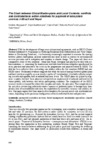Please use this identifier to cite or link to this item:
http://www.alice.cnptia.embrapa.br/alice/handle/doc/1002325| Title: | The Clash between Global Master-plans and Local Contexts: conflicts and contradictions within initiatives for payment of ecosystem services in Brazil and Nepal. |
| Authors: | MARQUARDT, K.  BARTHOLDSON, Ö.   PAIN, A.   PORRO, R.   SALOMSSON, L.   |
| Affiliation: | Kristina Marquardt, Swedish University of Agricultural Sciences; Örjan Bartholdson, Swedish University of Agricultural Sciences; Adam Pain, Swedish University of Agricultural Sciences; ROBERTO PORRO, CPATU; Lennart Salomsson, Swedish University of Agricultural Sciences. |
| Date Issued: | 2014 |
| Citation: | In: EUROPEAN IFSA SYMPOSIUM, 11., 2014, Berlin. Farming systems facing global challenges: Capacities and strategies: Proceedings. [Müncheberg]: ZALF; [Vienna]: IFSA, 2014. |
| Pages: | p. 866-875. |
| Description: | With the development of large-scale international agreements, such as REDD (United Nations Collaborative Programme on Reducing Emissions from Deforestation and Forest Degradation in Developing Countries), it is becoming increasingly important to examine the synergy between global masterplans, national endeavors and local actions in relation to environmental services provision and to mitigation and adaption to climate change. This paper will draw on a comparative study of two countries?, Brazil and Nepal, strategies and practices to deal with carbon emissions, i.e. examining the tensions and contradictions between mitigation agendas and the roles, practices and interests of the actors in the programmes and projects related to REDD. The data has been collected from contrasting case studies within the two countries (REDD and nonREDD cases). Preliminary evidence suggests that while the lack of synergy between global plans and local practices might be seen as simply a matter of ?coordination?, it actually reflects competing interests and agendas, both at national and local levels. The REDD plans are guided by a generic template, but how these plans are interpreted and implemented at national and local levels varies greatly, both between and within participating countries. The complexity of the REDD schemes creates a demand for actors who can plan and broker the processes. This complexity and the lack of an overarching reflexivity create a number of problems linked to transparency, complexity, lack of accountability and room for exploitation by powerful economic and political actors. This paper argues that these aspects often transform the planned results into unintended outcomes, depending on the particular configuration of local contextual factors and processes. |
| Thesagro: | Agricultura Familiar Mudança Climática |
| NAL Thesaurus: | Amazonia forest management climate change |
| Keywords: | Paymentof ecosystem services Smallholder agriculture Amazon Himalaya Manejo florestal |
| Type of Material: | Artigo em anais e proceedings |
| Access: | openAccess |
| Appears in Collections: | Artigo em anais de congresso (CPATU)  |
Files in This Item:
| File | Description | Size | Format | |
|---|---|---|---|---|
| WS18Marquardt.pdf | 257,37 kB | Adobe PDF |  View/Open |









